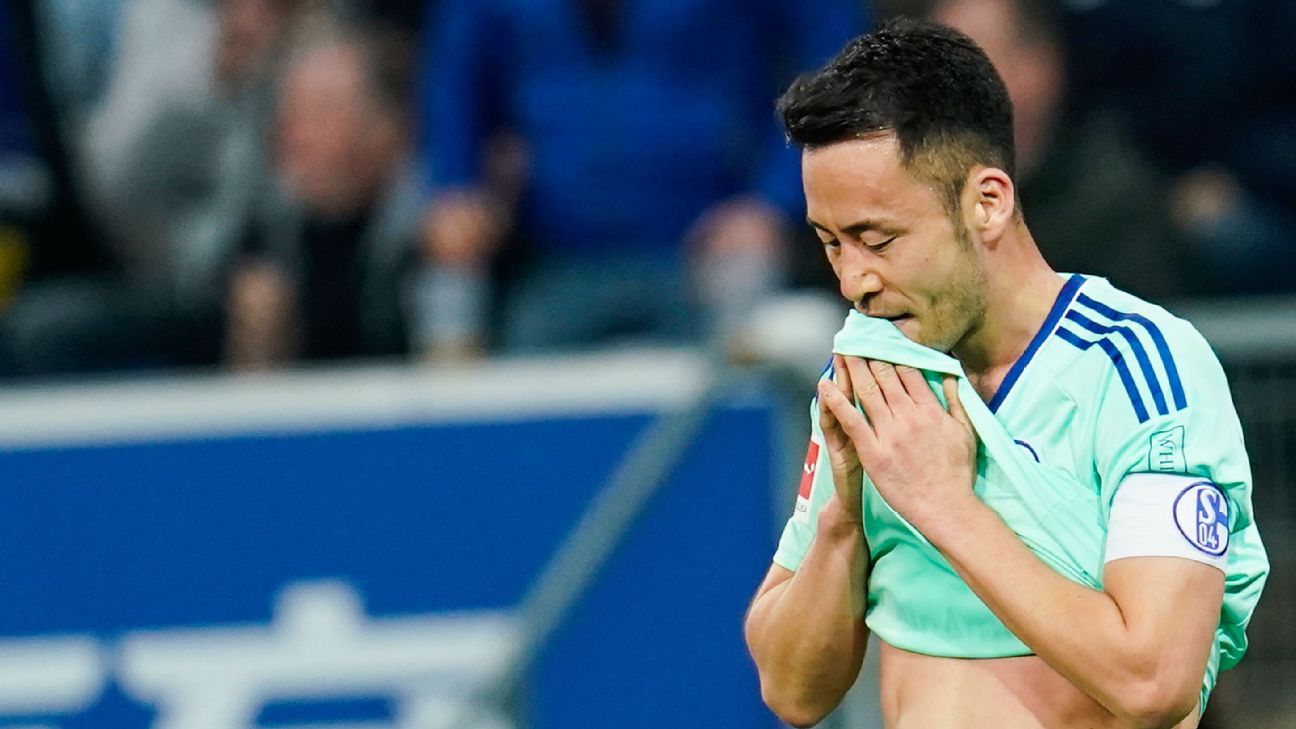How the Bundesliga’s relegation race could play out

With seven matches to go until the end of the Bundesliga season, the relegation race is still not giving German football fans any answers on who will avoid the drop. With Schalke 04 vs. Hertha Berlin on Friday (2:30 p.m. ET, stream live on ESPN+) having a significant impact on who will fall to the second division, the situation of the bottom three teams may become clearer or more muddled with the six bottom sides only being eight points apart.
Just before the season restarted, I used data to try to predict what would happen in the second half, but data only goes so far and is always changings. The picture has changed since then. So what’s different and who does the data suggest is likely to remain in Germany’s top flight in 2023-24?
In January, it looked as though Augsburg and VfL Bochum would fight it out to determine who would automatically be relegated and who would contest the relegation playoff. Augsburg’s issues at the time were primarily attacking related, but because of their quality and intensity — especially in duels and high pressures — they looked more likely to be in the playoff or even safe from the drop entirely.
– Stream on ESPN+: LaLiga, Bundesliga, more (U.S.)
Fast-forward three months and not a lot has changed, apart from their standing in the table, but Augsburg are prone to running out of energy and it’s telling that their actions in the final third and touches in the box have fallen into the bottom three in the league, while all their other metrics are still in the bottom half. Against the teams around them, they would probably be strong enough to win, but out of the bottom six, they have the most difficult fixture list remaining with their opponents earning an average of 1.58 points per game. As much as they could beat RB Leipzig in their next match and prove data wrong, they’re just as likely to lose ground to those around them and could make a surprise return to the danger zone, especially if TSG Hoffenheim and VfB Stuttgart can continue their fine form.
 14. TSG Hoffenheim | 28 points
14. TSG Hoffenheim | 28 points
Hoffenheim weren’t even really in the frame for relegation three months ago, but after the resumption of play following the World Cup break, their winless run reached 15 games. Head coach Andre Breitenreiter was sacked during this spell, and new manager Pellegrino Matarazzo finally ended it against Hertha — his sixth match in charge. During this run, they were the worst team in possessions ending in goals, sequences ending in shots, 14th in duels and tackling success rate and 17th in shots on goal. However, they have won their past three matches and now aren’t that far away from safety.
In these three wins, they’ve completely turned their form around, leading the league in possessions ending in goals and big chances created during this stretch, and improved to a midtable standard of tackling and duels success rate. While these games have been against the likes of Hertha and Schalke 04, they only need to beat the teams around them to stay up. While their remaining opponents have an average points per game of 1.52, they do include Stuttgart and FC Cologne, which should be enough to stay up.
 15. Bochum | 26 points
15. Bochum | 26 points
Bochum’s issues with shots on goal, possessions ending in goals and chance creation have improved since the winter break, with these metrics now being ranked that of a midtable team. They’re also one of the strongest teams on set-piece expected goals. They also are ranking higher in statistics often aligned with intensity including duels and high pressures.
Based on that alone, you would think that they would stay in a safe position for the rest of the season, however their fixture list so far has been kinder to them than their relegation rivals. That will change very soon with their remaining opponents having an average of 1.57 points per game, with that number going to 1.85 in their next four: at Union Berlin, vs. VfL Wolfsburg, vs. Borussia Dortmund and at Borussia Monchengladbach. While Bochum have laid a good foundation for staying up, the strength of the teams that might push them down the order can’t be ignored, and therefore their chances of safety will be significantly affected if Stuttgart or Schalke can overtake them or if Hoffenheim or Augsburg drop below them.
 16. Stuttgart | 23 points
16. Stuttgart | 23 points
In January, data didn’t accurately reflect Stuttgart’s future as they had just hired Bruno Labbadia as manager, and thus we would need more games to see if they would demonstrably improve. Unfortunately, for our purposes, he was fired earlier this month, replaced by ex-Hoffenheim coach Sebastian Hoeneß, leaving us in the same predicament of not knowing how or whether they’ll improve.
Stuttgart have seen a general improvement since the winter break and are now sixth in actions in the final third, seventh in big chances created and fifth in sequences ending in shots. These statistics were definitely on display as they beat Bochum 3-1 to leap over both Schalke and Hertha into the relegation playoff. Their remaining opponents average 1.23 points per game, so they also have an easier run-in than others, and they also have the quality in players like Borna Sosa, Konstantinos Mavropanos and Silas Katompa Mvumpa. They should, based on this and data, stay up.
 17. Hertha Berlin | 22 points
17. Hertha Berlin | 22 points
Hertha are a side deserving of their standing of second bottom of the table — and likely worse. Despite the quality possessed by the likes of Suat Serdar, Marco Richter and Dodi Lukebakio, Hertha haven’t been able to do much, and even less so since the restart.
Three months ago, I predicted they would not be relegated as their defence was stable, but their duels and interception statistics have dropped without any meaningful improvement in attack. Additionally, they are the worst team in the Bundesliga getting the ball into the final third and rank second last in actions into the opposing third, so it may not come as a surprise that they are struggling for goals.
This could change with a result against Schalke on Friday, but there’s an issue with this: Hertha will be at Schalke, and their away form has been pitiful with only one win from 13 matches (2D-10L). While Schalke are also the worst team at home, their form is better than their upcoming opponents’.
One thing that might swing a result is the Berlin side’s knack for scoring non-penalty set-piece goals with 15 of their 31 goals coming from corners and free kicks. It’s also worth noting that Hertha’s run is the easiest of all the other relegation candidates with their opponents averaging 1.21 points per game.
Apart from that, the future is pretty bleak.
 18. Schalke | 21 points
18. Schalke | 21 points
Although they’re still sitting last of the league, Schalke have definitely given themselves more hope since the World Cup break with 12 points in 12 games and now only five from safety.
While they were in the bottom three for nearly every metric available in January, they are now seventh in sequences ending in shots, 11th in actions in the opponents’ box and out of the bottom for actions in the final third. These demonstrate that they are getting the ball further forward than before, giving them a greater chance of survival under Thomas Reis. However, they are still not creating big chances and therefore aren’t scoring enough. While this probably would have been enough to survive had they played this way from the start of the season, it may not be enough now, especially as they face SC Freiburg, Bayern Munich and RB Leipzig in their run-in, which includes opponents averaging 1.56 points per game.
Statistically, Schalke aren’t the worst team in the league anymore. With a match against horrendous Hertha at home, that may just put them in a stronger position to begin their climb out of the basement of the Bundesliga.
